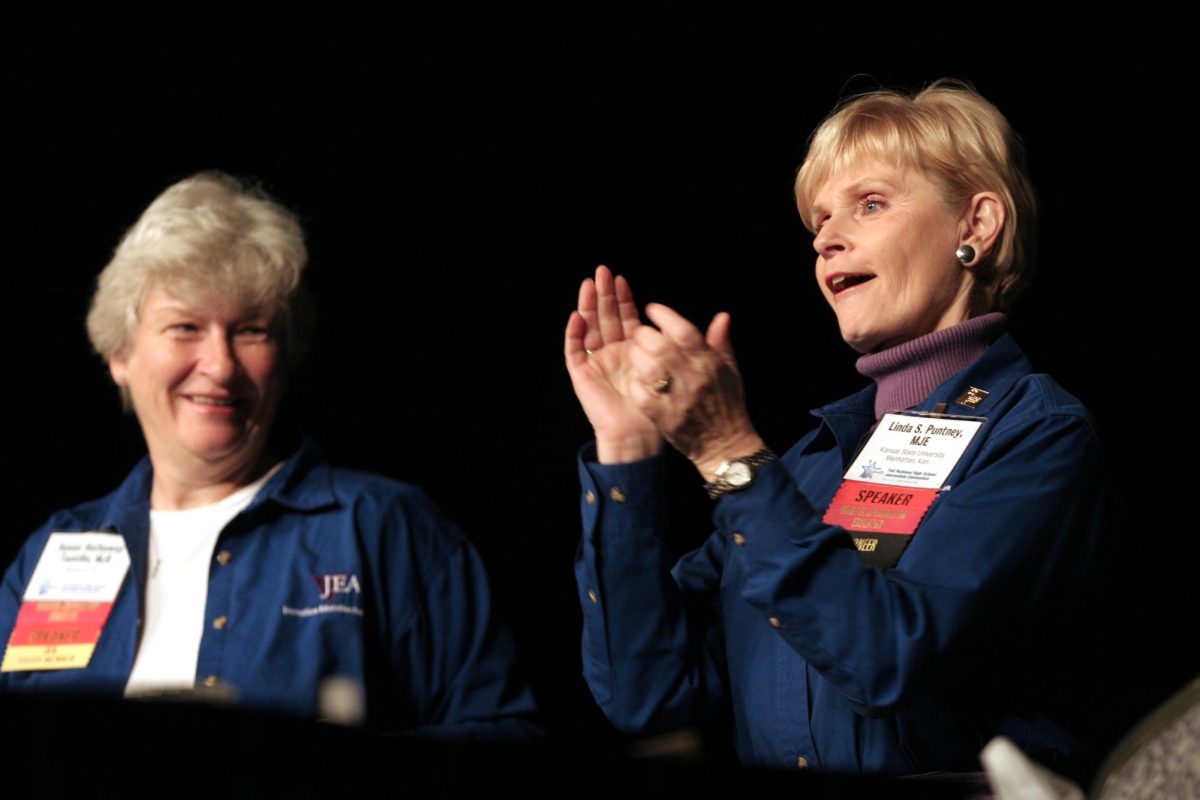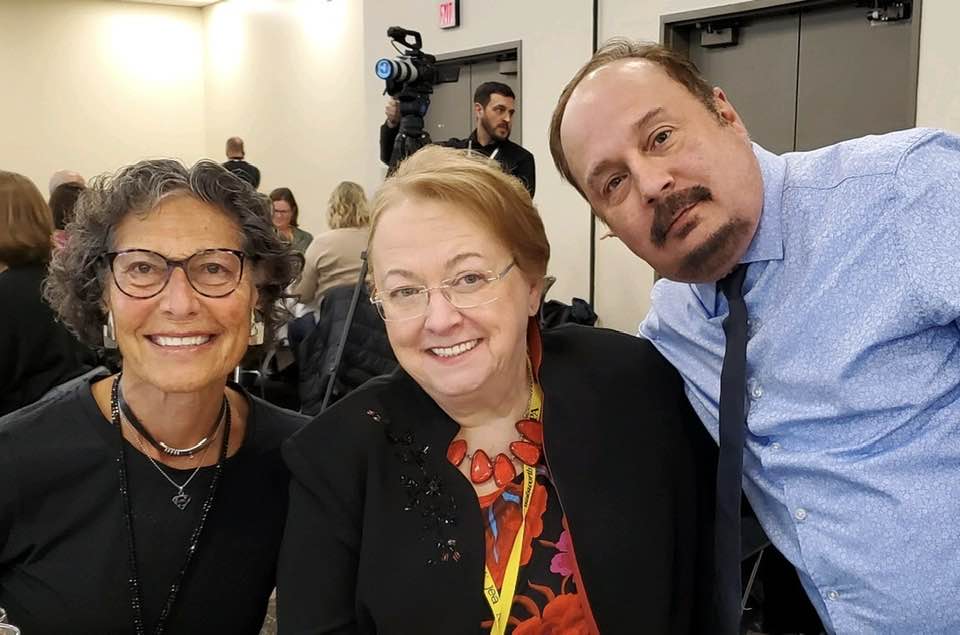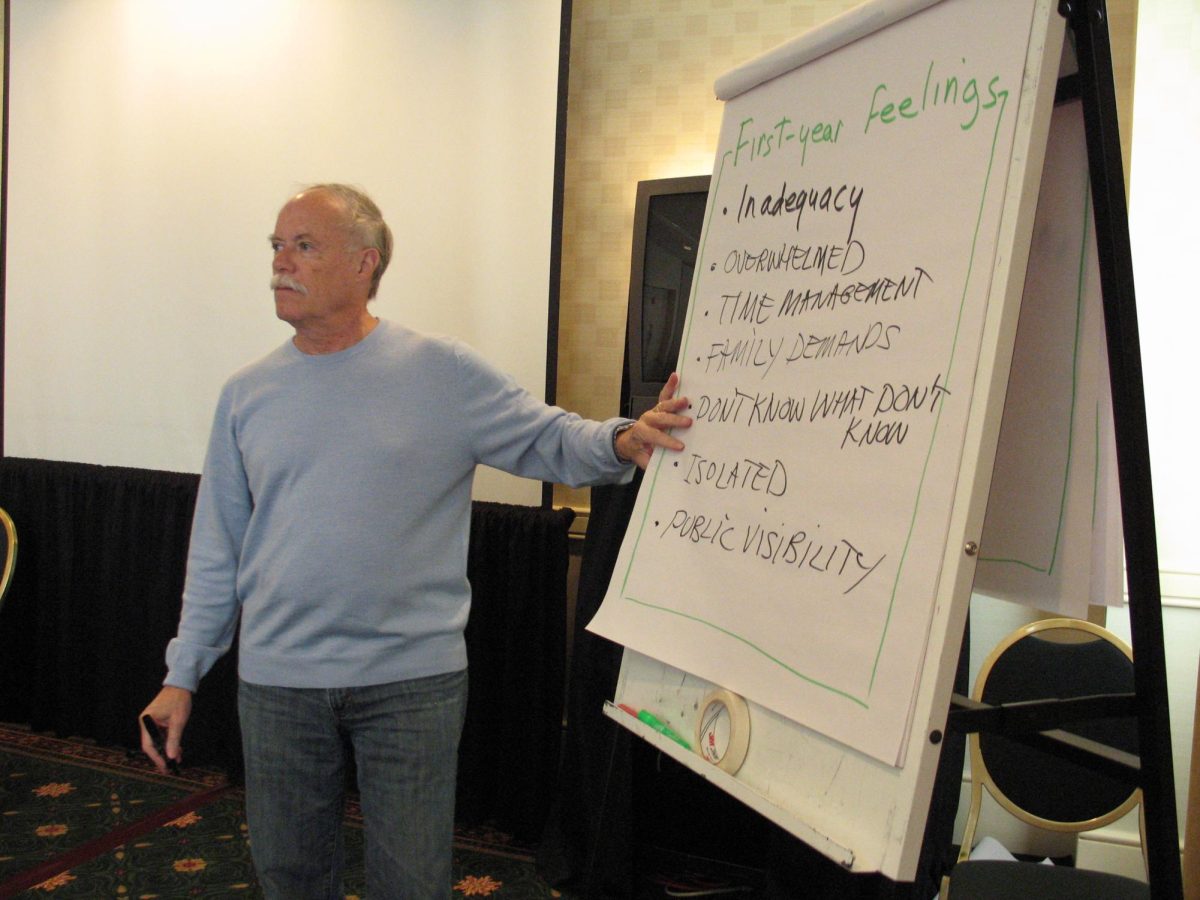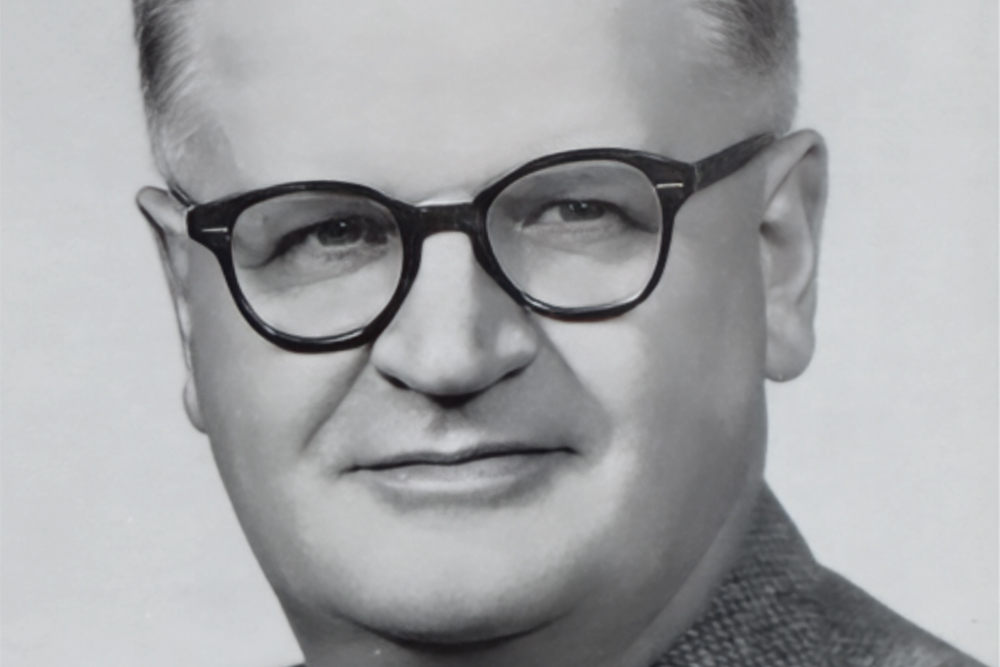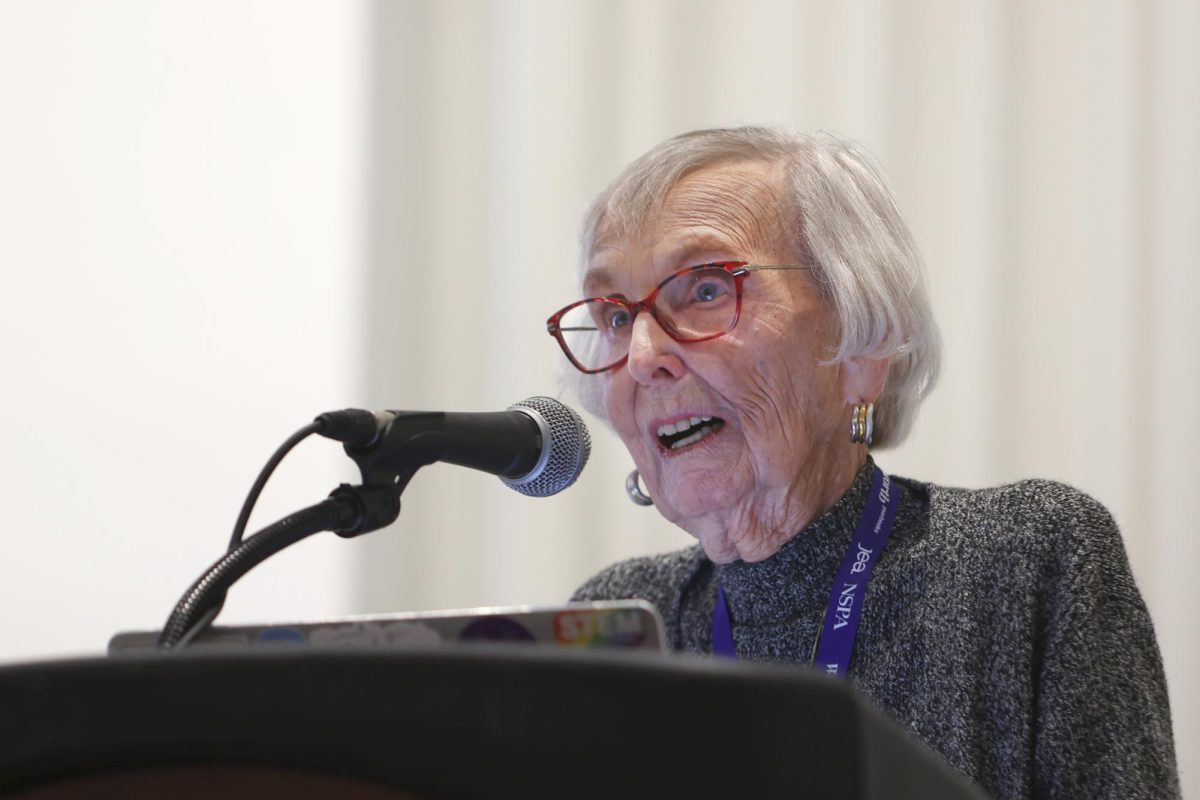While Linda Puntney, MJE, makes a strong first impression, the one that’s lasting is even greater.
“I remember this mythical figure in the distance,” recalled Ellen Austin, who advised award-winning staffers in four schools beginning just after the turn of the century. Her first memories of Linda Puntney are clear in her mind decades later. “She was impeccable in purple, a body in motion with a constant smile. And, yet, she was intimidating. She knew so much, and so many; and she was so passionate about scholastic journalism and the missions of JEA.”
“I’ll never forget the first time I saw her,” remembered Debra Klevens, the 2023 National High School Journalism Teacher of the Year. “We were on the same plane, flying to D.C. where my friend and I were enrolled in a media law class she was teaching. I was a new adviser about to learn from this mighty little giant. It was exciting — and it made me nervous.”
For many people — and for decades — Puntney was the face of JEA. Those who knew her from afar knew her convention persona well. Suited and smiling, she welcomed the masses to great cities from coast to coast with unforgettable convention rules advisers (and staffers) of the era can probably still repeat today: “No drugs. No booze. No babies.” She had all the answers. Knew everyone and everything.
As executive director from 1989-2010, Puntney not only planned and ran events, she taught, presented awards, visited schools, coordinated volunteers, fielded questions and complaints and attempted to imagine the future of scholastic journalism.
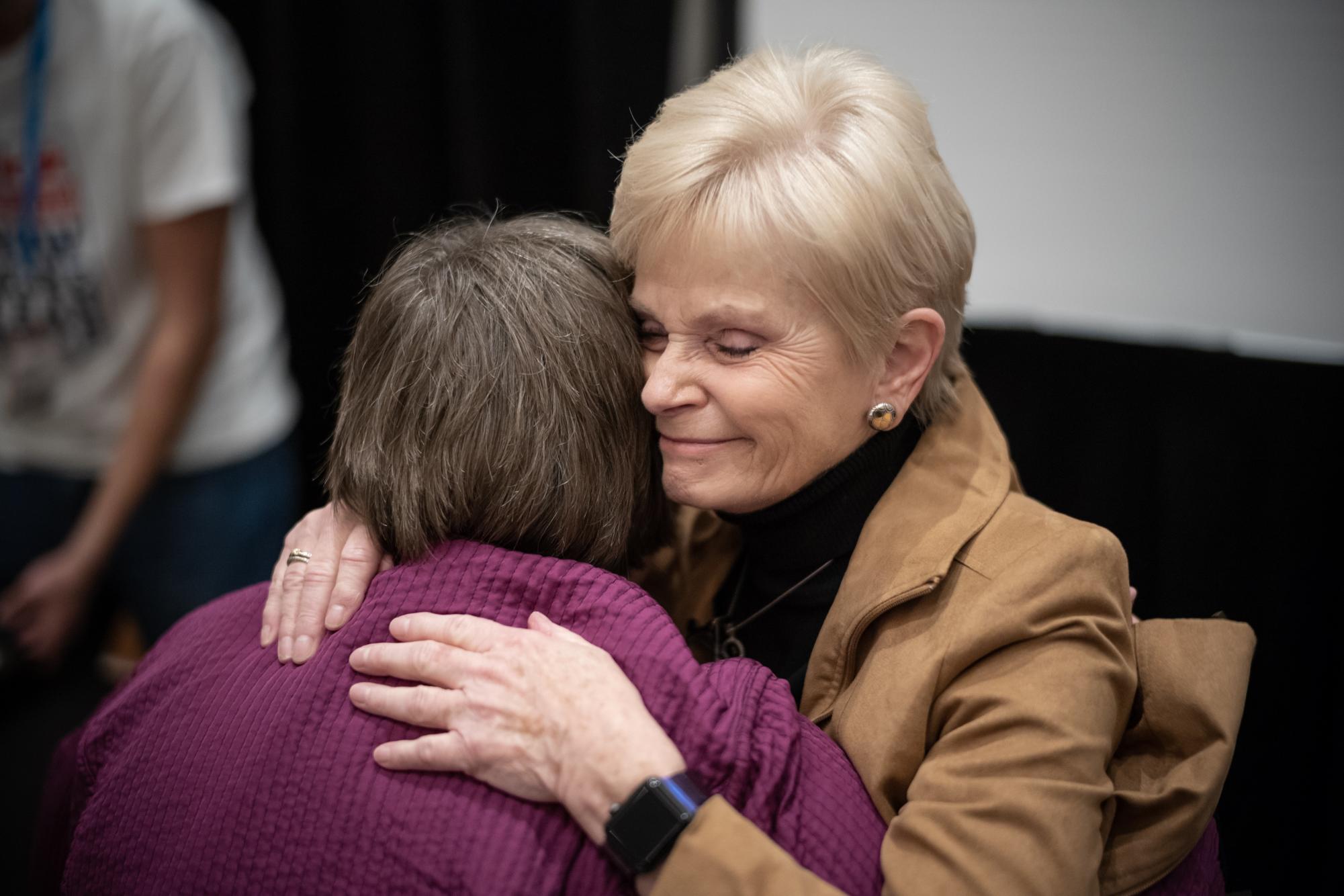
Encouraged to pursue writing by her high school English teacher in a school with no journalism curriculum, she interned at the community newspaper before enrolling at the University of Missouri as a pre-Journalism major. Despite roles on several campus publications, she graduated with a degree in English Education and minors in library science and Spanish.
Puntney’s first teaching job at Fort Osage High School in Independence, Missouri, included both English courses and journalism. She advised the newspaper and yearbook and served as the junior class and cheerleading sponsors.
But, perhaps more importantly, her work there introduced her to the Journalism Education Association. Ron Clemons, who advised at Independence’s Truman High School and would serve as president of JEA from 1979-1983 and win the Carl Towley Award as he completed his term, encouraged her to get involved. In true Puntney fashion, she jumped right in, selling ads with Clemons for C:JET magazine while her involvement with Missouri Interscholastic Press Association included teaching the summer workshop, presenting convention sessions and serving as president during those seven years.
Next, Puntney accepted a journalism-only position at nearby William Chrisman High School and taught four years there before she began advising at the collegiate level, moving to Northwest Missouri State University and Cowley County Community College. In 1989, she was encouraged by David Adams (then JEA executive secretary) to Kansas State University to serve as JEA’s executive secretary, an assistant professor in the A. Q. Miller School of Journalism and Mass Communication, Assistant Director of Student Publications and adviser to the Royal Purple yearbook.
“Every part of the job was something I loved,” she said. “But I never dreamed of having a job like that. Dave Adams, had accepted a job at Indiana and said he’d written the job description for the K-State position thinking of me. He definitely wanted someone who was as passionate about yearbook as he was. It was just beyond my realm of expectation to be in the classroom, advise a publication and to work with high school journalism programs.”
Puntney thrived on the collaborative aspects of her work with JEA. “I loved that the board constantly worked for the good of the organization and consequently the members. The goal was always to make the lives of advisers everywhere better. There were so many new platforms and services because of their work. And so many members who were generous with their knowledge, their time and resources they had created. The sense of community in the world of scholastic journalism is strong.
“I was blessed to learn from the six presidents (Ken Siver, Candace Bowen, H.L. Hall, Ann Visser, Jack Kennedy and Mark Newton) I worked with. It just a great team atmosphere.
“We also had amazing professional partnerships, not just with NSPA, NNA and NCTE, but with the Freedom Forum, the First Amendment Center, Poynter and SPLC. Together, we improved offerings for those teaching and advising America’s young journalists.
“There were some hard moments and lots of long hours, but when you believe in your mission, it’s easy to love your job. Being at the conventions and seeing the interaction and celebration, the networking and the learning was phenomenal,” she concluded.
Austin, who served several terms on the JEA board as Western Regional Director, observed Puntney’s work from the front lines through the years. “The way she led the organization through the profound shifts in journalism was most impressive,” she said. “She navigated tsunami waves of implication — huge changes in funding, in the roles of media and membership needs. After years of relative calm, she was helping steer one of the industry’s largest ships through the storm. I have such great respect for the work she did — and I am grateful that I had the opportunity to get to know her on a personal level as well.”
Klevens, a current JEA director at large, also knows more of Puntney today. “She’s a confident woman who has so much to share. What a wealth of knowledge and passion. And she has a heart of gold; she’d do anything to help an adviser promote good journalism.”
Puntney, who was presented with her Towley in 1998 at the National Press Club in Washington D.C., is a member of the College Media Association Hall of Fame, and received CSPA’s Gold Key, and Charles O’Malley Award for Excellence in Teaching, NSPA’s Pioneer Award and JEA’s Medal of Merit, Teacher Inspiration and Lifetime Achievement Awards. In addition, the JEA Teacher Inspiration Award, which “recognizes a teacher who, through the teaching and/or advising of journalism, inspired others to pursue journalism teaching as a career and who has made a positive difference in the teaching community,” now carries her name.


